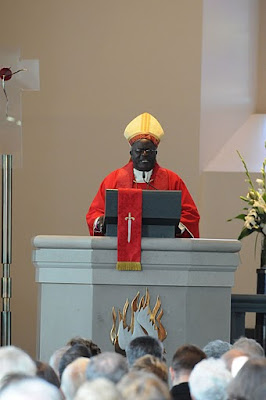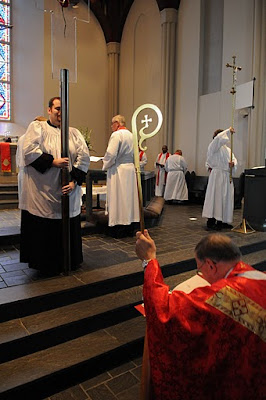Reflecting on the Gospel for Trinity 15 (Matthew 6:24-34), where Jesus says it’s impossible to worship both God and Mammon, has gotten me thinking about opposites.
Trust & Worry
Trust and worry, or trust and fear, are opposites. Worry and anxiety are evidence of a lack of faith, a lack of trust in God’s gracious provision, in His day-to-day protection. Thus the Creed teaches us that our Heavenly Father “defends us against all danger, guards and protects us from all evil.” He does, He really does. Childlike faith knows this and expects it at all times, just as a child expects complete and perfect protection from her father. To worry is to believe that God either is unable to take care of you or is unwilling to do so. Faith, rather, knows that God disciplines those whom He loves, giving them crosses to bear from time to time to conform them to His Son, that their lives might likewise be cruciform, that they might likewise love others selflessly.
Thankfulness & Entitlement
“Get the car that you deserve,” says the commercial on the radio, which pretty much summarizes most marketing: you deserve better. That’s the mindset of entitlement. You deserve something nice and comfortable, some handsome reward for your hard work. That’s what you deserve, so it’s what God should give you.
Again, the First Article of the Creed teaches differently. “All this He does only out of fatherly, divine goodness and mercy, without any merit or worthiness in me.” Faith is not concerned with entitlement, with what you think you deserve. Rather, repentant faith knows you deserve nothing good. Everything good you receive, is because of God’s fatherly, divine goodness and mercy. So faith receives all the daily bread God provides with thankfulness, not entitlement.
Forgiveness & Tolerance
One of the culture’s highest virtues is tolerance. Despite how liberal Christians want to reinterpret God, though, He is anything but tolerant. If He were tolerant of sin, foibles, peccadilloes, or deviations from His law, He would not have sent His Son to die for sin. If tolerance were an option, forgiveness would not be necessary. Instead of “tolerant,” God describes Himself as “gracious and merciful, slow to anger, and abounding in steadfast love.”
Faith seeks not tolerance from God but forgiveness. In repentance, faith acknowledges that God is intolerant of our sin and even intolerant of sinners. The proof of God’s intolerance, of His hatred for sin, is on the cross. There, sin’s ugliness and God’s contempt for sin and sinners was displayed when God the Son cried out in dereliction—abandonment—to an unanswering God the Father. The Father had no ear for Jesus’ plea, having laid on Him the sin of all humanity, having made Him who knew no sin to be sin for us.
Unbelief seeks tolerance, acceptance of our sins. Faith looks to Jesus for forgiveness. Faith knows that Jesus answered for all sin, so that we might be the very righteousness of Jesus.
All of these pairs are essentially expressions of faith and unbelief, which are opposites in every way. I’m sure there are plenty more expressions of faith and unbelief that are opposites, but these are the ones I’ve been thinking about the most.
Faith is a gift; unbelief is a work. Faith clings to Jesus; unbelief trusts in our selves. Unbelief lives inside the self; faith lives externally, in receiving the gifts God delivers outside ourselves and in loving and serving those we encounter in our vocations.



